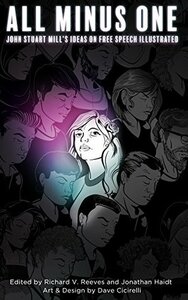Take a photo of a barcode or cover
5 reviews for:
All Minus One: John Stuart Mill's Ideas on Free Speech Illustrated
Dave Cicirelli, Richard V. Reeves, Jonathan Haidt
5 reviews for:
All Minus One: John Stuart Mill's Ideas on Free Speech Illustrated
Dave Cicirelli, Richard V. Reeves, Jonathan Haidt
informative
slow-paced
Wisdom and some poignant art- along with an invitation
“...However true [your belief] may be, if it is not fully, frequently, and fearlessly discussed, it will be held as a dead dogma, not a living truth.”
“...However true [your belief] may be, if it is not fully, frequently, and fearlessly discussed, it will be held as a dead dogma, not a living truth.”
I love the idea for this book—take one of the most important texts of all time and make it more accessible. While it cut’s Mill’s On Liberty down quite a bit, the authors have preserved the most important revelations that Mill had. While the language is still a bit inaccessible for those of us used to modern rhetoric, the fact that it is so much shorter than the original helps. I think I will retain much more this time than when I read On Liberty originally several years ago.
The compiling authors summarized one of my most dear opinions beautifully: “For free speech to be valuable to the pursuit of truth, we all need to be both humble and open. We need humility to recognize that we might not be right about everything all of the time, and that we have something to learn from others. We also need to be open to the possibility of altering our views, opinions, and even values based on our engagement with the world. In other words, our identity as a person must be kept separable from the ideas we happen to endorse at a given time. Otherwise, when those ideas are criticized, we are likely to experience a conversation, book, or lecture as an attack upon our self, rather than as an opportunity to think about something more deeply.”
Mill’s arguments are for free speech, and why it is so important in order to find truth. I’ll paraphrase in modern english some of my favorite insights from his text:
• We all admit we are fallible, but few take precautions against their fallibility. When we feel something is certain, we refuse to admit that this might be an example of one of the times we are wrong.
• Even certain ideas held dear by entire generations of people are fallible. Just like people within an age might reject ideas of individuals, different ages reject ideas of other ages. Strength in numbers doesn’t guarantee infallibility.
• The thing that allows us to reasonably state that something is true is that we are saying it stands against arguments that would prove it false. If you refuse to hear any arguments against it then the claim to truth is thus undermined.
• The dictum that “truth always triumphs over persecution” is one of those pleasant falsehoods which we repeat until it is commonplace. History is replete with examples of truth being put down by persecution, and if not suppressed forever, it may be thrown back for centuries
• The idea that man is more zealous for truth than for error may not be the case. There is enough cognitive dissonance available for people to relish in their falsehoods.
• The greatest harm done by ban on inquiry is those whose mental development is lost by engaging with those ideas. The masses suffer.
• However resistant one is to admitting that their opinion is false, and no matter if it’s in fact entirely true, if they do not allow it do be discussed fully, frequently, and fearlessly it will be held as a dead dogma rather than a living truth.
• It is terrible offense in search of truth to stigmatize those who hold the contrary opinion as bad and immoral.
This book was written to be a more approachable version of On Liberty and everyone ought read it.
View my best reviews and a collection of mental models at jasperburns.blog.
The compiling authors summarized one of my most dear opinions beautifully: “For free speech to be valuable to the pursuit of truth, we all need to be both humble and open. We need humility to recognize that we might not be right about everything all of the time, and that we have something to learn from others. We also need to be open to the possibility of altering our views, opinions, and even values based on our engagement with the world. In other words, our identity as a person must be kept separable from the ideas we happen to endorse at a given time. Otherwise, when those ideas are criticized, we are likely to experience a conversation, book, or lecture as an attack upon our self, rather than as an opportunity to think about something more deeply.”
Mill’s arguments are for free speech, and why it is so important in order to find truth. I’ll paraphrase in modern english some of my favorite insights from his text:
• We all admit we are fallible, but few take precautions against their fallibility. When we feel something is certain, we refuse to admit that this might be an example of one of the times we are wrong.
• Even certain ideas held dear by entire generations of people are fallible. Just like people within an age might reject ideas of individuals, different ages reject ideas of other ages. Strength in numbers doesn’t guarantee infallibility.
• The thing that allows us to reasonably state that something is true is that we are saying it stands against arguments that would prove it false. If you refuse to hear any arguments against it then the claim to truth is thus undermined.
• The dictum that “truth always triumphs over persecution” is one of those pleasant falsehoods which we repeat until it is commonplace. History is replete with examples of truth being put down by persecution, and if not suppressed forever, it may be thrown back for centuries
• The idea that man is more zealous for truth than for error may not be the case. There is enough cognitive dissonance available for people to relish in their falsehoods.
• The greatest harm done by ban on inquiry is those whose mental development is lost by engaging with those ideas. The masses suffer.
• However resistant one is to admitting that their opinion is false, and no matter if it’s in fact entirely true, if they do not allow it do be discussed fully, frequently, and fearlessly it will be held as a dead dogma rather than a living truth.
• It is terrible offense in search of truth to stigmatize those who hold the contrary opinion as bad and immoral.
This book was written to be a more approachable version of On Liberty and everyone ought read it.
View my best reviews and a collection of mental models at jasperburns.blog.
A really great text about speech.
What's interesting is Mill was writing in the 1800's, and he was writing about the problems with speech oppressed by societal norms as opposed to government suppression of speech. It's pretty relevant in modern times, which is sort of surprising. You'd think our gizmos would render something like this ancient and worthless, but there's a lot of applicable good in here.
He's got three very basic tenets:
1. Dissenting opinion is important because it may be correct. This is a tougher one that it sounds because we all like to believe that we're mostly right, and when we look back at history we like to think that we'd somehow know things the people living in that time didn't know. We've all heard someone wax on about how they surely would have behaved during witch trials, civil rights struggles, wars, etc. But the truth of the matter is that most of us have been wrong most of the time, and this hasn't stopped being true. We are all wrong about something today, and 50 years from now we'll be seen as monsters. Count on it. Hey, if it turns out that in 2069 people are like, "Those 2019 folks had it all figured out!" I'll buy you a drink.
2. It's in arguing with a dissenting opinion that we reaffirm our understanding of the truth. When truths become accepted and are no longer challenged, we lose touch with their meaning and origin, and future challenges to the truth are more difficult to dismiss. To make a technology analogy, we all use lamps, but very few of us could wire one from scratch. Having received knowledge on an issue challenged forces us to understand the issue and our stance on it completely.
3. Both the correct and incorrect opinions contain portions of the whole of truth, and it's by those opinions combining that we get closer to truth. Without dissenting opinions, we only get the portion of the truth that serves our purposes.
All of this requires a lot of listening skills and patience, but there are some really thoughtful ideas in this piece, and it's only like a 30-minute read.
What's interesting is Mill was writing in the 1800's, and he was writing about the problems with speech oppressed by societal norms as opposed to government suppression of speech. It's pretty relevant in modern times, which is sort of surprising. You'd think our gizmos would render something like this ancient and worthless, but there's a lot of applicable good in here.
He's got three very basic tenets:
1. Dissenting opinion is important because it may be correct. This is a tougher one that it sounds because we all like to believe that we're mostly right, and when we look back at history we like to think that we'd somehow know things the people living in that time didn't know. We've all heard someone wax on about how they surely would have behaved during witch trials, civil rights struggles, wars, etc. But the truth of the matter is that most of us have been wrong most of the time, and this hasn't stopped being true. We are all wrong about something today, and 50 years from now we'll be seen as monsters. Count on it. Hey, if it turns out that in 2069 people are like, "Those 2019 folks had it all figured out!" I'll buy you a drink.
2. It's in arguing with a dissenting opinion that we reaffirm our understanding of the truth. When truths become accepted and are no longer challenged, we lose touch with their meaning and origin, and future challenges to the truth are more difficult to dismiss. To make a technology analogy, we all use lamps, but very few of us could wire one from scratch. Having received knowledge on an issue challenged forces us to understand the issue and our stance on it completely.
3. Both the correct and incorrect opinions contain portions of the whole of truth, and it's by those opinions combining that we get closer to truth. Without dissenting opinions, we only get the portion of the truth that serves our purposes.
All of this requires a lot of listening skills and patience, but there are some really thoughtful ideas in this piece, and it's only like a 30-minute read.
Inspiring thoughts on free speech. I had to put some of the quotes to my favorites.


